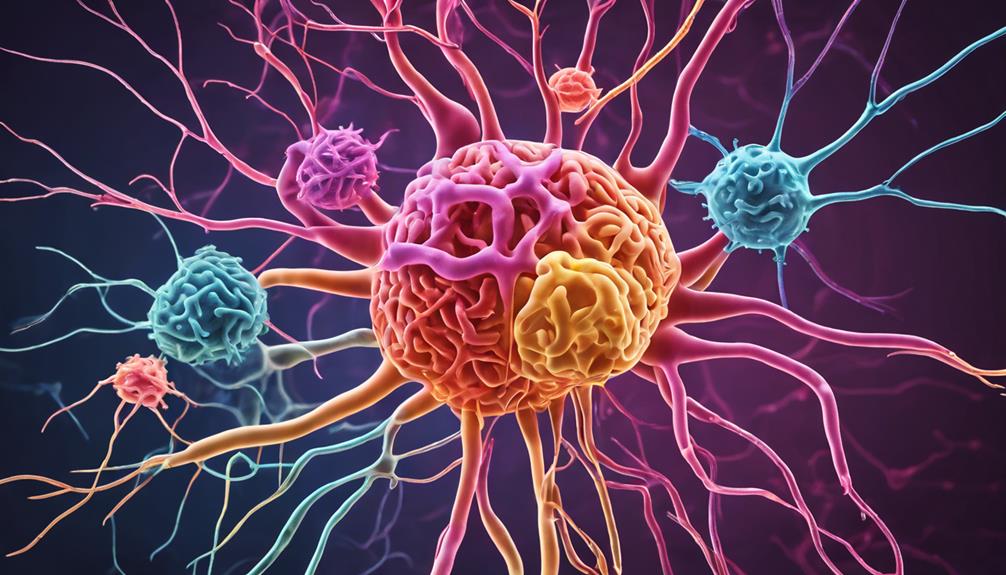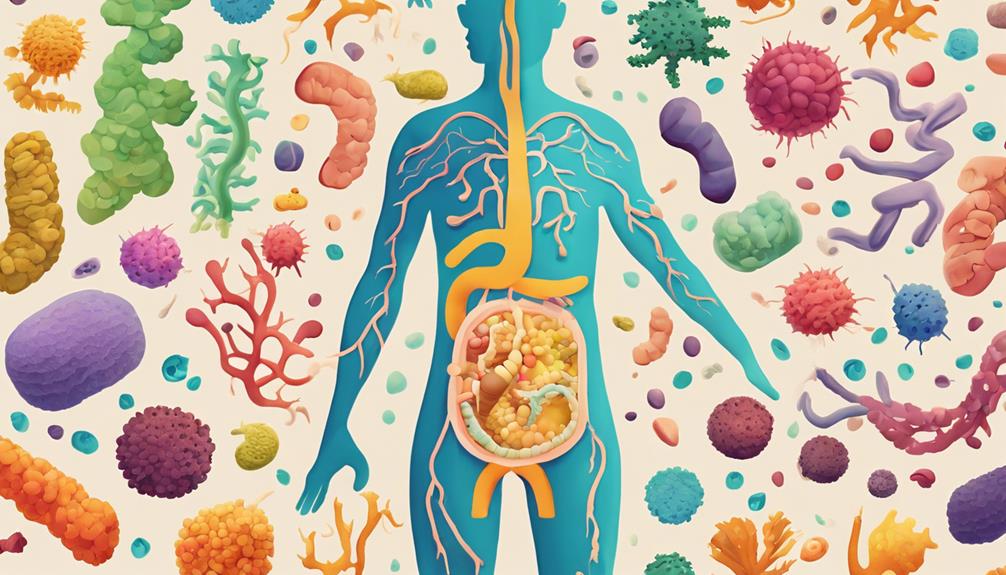The Importance of a Healthy Gut
Did you know that your gut is home to a complex ecosystem of microorganisms that outnumber your body's cells? The health of this community of bacteria, fungi, and other microbes can significantly impact various aspects of your well-being. From influencing your immune system to affecting your mood and mental health, the state of your gut plays a crucial role in maintaining overall wellness. Understanding how to nurture and support a healthy gut can lead to profound benefits for your entire body.
Key Takeaways
- Gut health impacts overall well-being and immune function.
- A diverse gut microbiome supports nutrient absorption.
- Balanced gut flora aids in digestion and produces essential nutrients.
- Gut bacteria influence mental health and emotional well-being.
- Proper gut balance reduces inflammation and supports a healthy immune system.
Gut Health Basics
Understanding the basics of gut health is essential for overall well-being. Your gut is home to trillions of microorganisms known as gut microbiota. These tiny inhabitants play a crucial role in maintaining your health. The balance of these gut microbiota is key to supporting your immune system, aiding digestion, and even influencing your mood.
Ensuring a healthy gut microbiota population comes with a myriad of gut health benefits. From improved nutrient absorption to bolstering your immune system, a well-balanced gut microbiome contributes to your overall vitality.
Additionally, these beneficial bacteria help in fermenting dietary fibers that your body can't digest, producing essential nutrients like short-chain fatty acids that support gut health.
Digestive System Overview
Your digestive system is a remarkable network of organs and tissues working together to break down food, absorb nutrients, and eliminate waste. It all begins in the mouth, where digestion kicks off with the help of enzymes in your saliva.
From there, the food travels down the esophagus to the stomach, where stomach acid and enzymes continue the breakdown process.
The small intestine is where the majority of nutrient absorption takes place, thanks to its vast surface area. Here, gut bacteria play a crucial role in breaking down complex carbohydrates and aiding in the absorption of nutrients.
The waste products then move on to the large intestine, where water is absorbed, and gut bacteria help further break down any remaining food particles.
Understanding these digestive processes is key to supporting a healthy gut. By nourishing your gut bacteria with a balanced diet rich in fiber and nutrients, you can promote optimal digestion and overall well-being.
Gut-Brain Connection
The Gut-Brain Connection is a complex and fascinating relationship between your digestive system and brain. This intricate link plays a crucial role in your overall well-being, influencing not just digestion but also emotions, mood, and even behavior. Stress management is a significant aspect of this connection. When you experience stress, it can impact your gut health, leading to symptoms like bloating or discomfort.
Conversely, an imbalanced gut can send signals to your brain, affecting your mental state.
One way to support this connection is through probiotic supplements. These supplements contain beneficial bacteria that can help maintain a healthy gut flora, which in turn positively affects your brain function. By promoting a balanced gut microbiome, probiotics can potentially aid in reducing stress levels and improving overall cognitive function.
Understanding and nurturing the Gut-Brain Connection is essential for your holistic health. By incorporating probiotic supplements and practicing stress management techniques, you can support this vital relationship and enhance both your digestive and mental well-being.
Immune System Support
For optimal health and resilience, supporting your immune system is paramount. Your gut microbiome plays a crucial role in enhancing your immune response. The gut houses a large portion of your body's immune cells, which are essential for fighting off pathogens and maintaining overall health.
A healthy gut microbiome helps regulate the immune system, ensuring that it responds appropriately to threats while avoiding unnecessary inflammation. When the balance of bacteria in your gut is disrupted, it can lead to immune dysregulation, increasing the risk of infections and autoimmune conditions.
By nurturing a diverse and balanced gut microbiome through a diet rich in fiber, fermented foods, and probiotics, you can support a strong immune response.
Furthermore, the gut microbiome communicates with the immune system, influencing the production of antibodies and other immune molecules. This intricate relationship highlights the importance of maintaining a healthy gut to bolster your immune defenses and protect against illness.
Importance of Gut Flora
In understanding the intricate workings of the digestive system, one can't overlook the pivotal role played by gut flora. Gut bacteria, also known as gut microbiota, are crucial for maintaining a healthy gut balance. These microorganisms aid in digesting food, producing essential nutrients, and even influencing your mood and immune system.
The diversity and abundance of gut bacteria are key factors in ensuring optimal gut function. When the balance of these bacteria is disrupted, it can lead to digestive issues, weakened immunity, and other health problems. Therefore, nurturing a diverse ecosystem of gut flora through a balanced diet rich in fiber, fermented foods, and prebiotics is essential for your overall well-being.
Signs of an Unhealthy Gut
Among the intricate symphony of functions performed by gut bacteria, there are clear indicators that can signal an imbalance in your gut health. Your gut microbiota, the diverse community of microorganisms residing in your gastrointestinal tract, plays a crucial role in maintaining overall well-being. When this delicate balance is disrupted, it can manifest in various signs of gut imbalance.
One common sign of an unhealthy gut is digestive issues such as bloating, gas, constipation, or diarrhea. These symptoms may indicate that your gut microbiota isn't functioning optimally.
Additionally, experiencing frequent fatigue, unexplained weight changes, or persistent bad breath can also be red flags for gut imbalance.
Furthermore, skin conditions like eczema, acne, or psoriasis can sometimes be linked to an unhealthy gut. The gut-skin axis highlights the interconnectedness of gut health and skin health, emphasizing the importance of addressing gut issues for overall well-being.
Factors Affecting Gut Health
Playing a significant role in your overall health, numerous factors influence the state of your gut health. Understanding these factors is crucial for maintaining a healthy gut microbiota and overall well-being. Here are some key gut health factors to consider:
- Diet: What you eat plays a significant role in shaping the composition of your gut microbiota. A diverse diet rich in fiber, fruits, vegetables, and fermented foods can promote a healthy gut environment.
- Stress: High levels of stress can negatively impact your gut health by disrupting the balance of gut bacteria. Finding ways to manage stress through relaxation techniques or mindfulness practices can benefit your gut.
- Sleep: Poor sleep habits can alter the composition of your gut microbiota, affecting digestion and overall gut health. Prioritizing good quality sleep is essential for a healthy gut.
- Physical Activity: Regular exercise not only benefits your overall health but also supports a diverse gut microbiota. Staying active can help maintain a healthy balance of gut bacteria.
Foods for Gut Health
For optimal gut health, incorporating specific foods into your diet can play a crucial role in supporting a diverse and thriving gut microbiota. Including gut-friendly recipes rich in fiber, such as fruits, vegetables, whole grains, and legumes, can promote a healthy gut environment. These foods help nourish the beneficial bacteria in your gut, aiding in digestion and overall well-being.
Probiotic supplements are another valuable addition to support gut health. These supplements contain live beneficial bacteria that can help restore the balance of your gut microbiota. Consuming probiotics regularly can enhance gut function and improve immune system health.
Incorporating a variety of fermented foods like yogurt, kefir, sauerkraut, and kimchi into your diet can also introduce beneficial bacteria to your gut. These foods can help increase the diversity of your gut microbiota, promoting better digestion and absorption of nutrients.
Gut-Healing Lifestyle Changes
To further enhance the health of your gut, implementing lifestyle changes that focus on gut healing can be immensely beneficial. By incorporating specific healing foods and adjusting your lifestyle habits, you can promote a healthier gut environment. Here are some practical steps you can take to support gut healing:
- Increase Fiber Intake: Consuming a variety of fruits, vegetables, and whole grains rich in fiber can nourish beneficial gut bacteria and support a healthy digestive system.
- Stay Hydrated: Drinking an adequate amount of water throughout the day helps maintain optimal digestion and supports the overall health of your gut.
- Manage Stress: Chronic stress can negatively impact gut health. Engage in stress-reducing activities like yoga, meditation, or spending time in nature to promote a healthier gut-brain connection.
- Prioritize Sleep: Quality sleep is essential for gut healing. Aim for 7-9 hours of restful sleep each night to support your body's natural healing processes.
Gut Health and Mental Health
Exploring the intricate connection between gut health and mental well-being reveals a fascinating interplay between the two systems. Your gut is home to trillions of bacteria that play a crucial role in not only your physical health but also your emotional well-being. Research has shown that the gut-brain axis, the communication network between the gut and brain, influences your mood, stress levels, and even mental health conditions like anxiety and depression.
| Gut Bacteria | Role | Impact on Emotional Well-being |
|---|---|---|
| Probiotics | Help maintain a healthy gut environment and support brain function | Linked to improved mood |
| Prebiotics | Feed the beneficial bacteria in your gut, promoting their growth | Associated with reduced stress |
| Gut Microbiome | Diversity of bacteria in the gut affects neurotransmitter production | Influences mental health issues |
Nurturing a diverse gut microbiome through a balanced diet rich in fiber and fermented foods can positively impact your emotional well-being. Taking care of your gut health is not just about digestion; it's about cultivating a healthy mind-body connection.
Gut Health and Inflammation
Research indicates a significant correlation between gut health and inflammation within the body. Your gut health plays a crucial role in regulating inflammation levels, which can have a profound impact on your overall well-being. Here are some key points to consider:
- Inflammatory Foods: Consuming a diet high in inflammatory foods, such as processed sugars and unhealthy fats, can disrupt the balance of good bacteria in your gut. This imbalance may lead to increased inflammation throughout your body.
- Gut Microbiome: The trillions of bacteria residing in your gut, known as the gut microbiome, play a vital role in immune function and inflammation regulation. A diverse and healthy gut microbiome is essential for maintaining optimal inflammation levels.
- Inflammation Levels: Chronic inflammation is linked to various health issues, including autoimmune conditions, heart disease, and digestive disorders. By supporting your gut health, you can help manage inflammation and reduce the risk of developing these conditions.
- Maintaining Gut Health: Eating a balanced diet rich in fiber, probiotics, and prebiotics, managing stress, staying hydrated, and avoiding inflammatory foods can all contribute to a healthy gut and lower inflammation levels.
Maintaining a Healthy Gut
Given the foundational connection between gut health and inflammation, it becomes evident that maintaining a healthy gut is paramount for overall well-being. Proper gut health maintenance involves a combination of factors such as a balanced diet rich in fiber, regular physical activity, stress management, and adequate hydration. By taking care of your gut, you can reap numerous gut health benefits, including improved digestion, strengthened immune system, better nutrient absorption, and even enhanced mood and mental clarity.
To help you understand the significance of maintaining a healthy gut, let's delve into some key practices that can support your gut health:
| Gut Health Maintenance | Description | Benefits |
|---|---|---|
| Balanced Diet | Incorporate fiber-rich foods and probiotics | Improved digestion, enhanced nutrient absorption |
| Physical Activity | Regular exercise for gut motility | Supports overall gut health and immune function |
| Stress Management | Techniques to reduce stress levels | Helps maintain a healthy balance of gut bacteria |
| Hydration | Drink enough water daily | Aids in digestion and detoxification processes |
Frequently Asked Questions
Can Stress Impact Gut Health and Digestion?
Yes, stress can impact gut health and digestion through the gut-brain connection. Managing stress effectively is crucial. Prioritize self-care, exercise, and relaxation techniques. Seek support from loved ones or professionals. Your gut health and overall well-being will benefit.
How Can Antibiotics Affect Gut Flora Balance?
When you take antibiotics, they can disrupt the delicate balance of gut bacteria, potentially leading to issues like antibiotic resistance. Be mindful of this impact on your gut flora to maintain overall health.
Is Leaky Gut Syndrome a Real Condition?
Yes, leaky gut syndrome is a real condition where the gut barrier becomes compromised, leading to increased gut inflammation. This can allow harmful substances to pass through, potentially impacting overall health. Maintaining gut health is crucial.
Can Probiotics Help With Mental Health Issues?
Feeling down? Probiotic benefits extend beyond your gut, supporting mental health too. These beneficial bacteria can help alleviate symptoms of anxiety and depression, promoting a healthier mind alongside a healthy body.
What Role Does Exercise Play in Gut Health?
To maintain a healthy gut, exercise impacts the gut-brain connection positively. Regular physical activity supports microbiome diversity, improving digestion and overall well-being. Stay active to promote a balanced gut environment and enhance your overall health.
Conclusion
So, remember to keep neglecting your gut health if you want to miss out on all the benefits of a healthy gut – like better digestion, a stronger immune system, and even improved mental health. But hey, who needs all that when you can just keep ignoring those gut-friendly lifestyle changes, right? Just kidding – take care of your gut, and it will take care of you.















